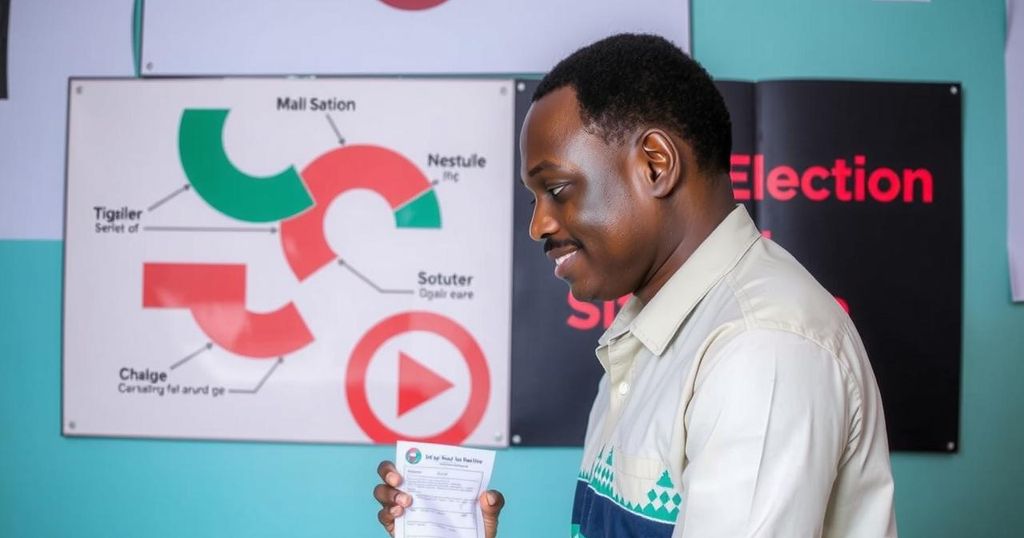Ghana Prepares for Pivotal Elections Amid Economic Challenges and Political Tensions

Ghana will hold elections on December 7 to choose a new president and Parliament members, amidst economic challenges and concerns over electoral integrity. The NDC and NPP are the primary parties, with candidates Mahamudu Bawumia and John Mahama leading the race. High voter turnout is anticipated, but the risk of violence looms over the electoral process. The election’s outcome will impact Ghana’s democratic health and West African stability.
On December 7, Ghanaians will engage in a critical electoral process to select a new president and parliamentary representatives across 275 constituencies. The contest features twelve presidential aspirants, with the National Democratic Congress (NDC) and the governing New Patriotic Party (NPP) as the primary contenders, reflecting the historical dominance of these parties since the re-establishment of multiparty democracy in 1992. The current president, Nana Akufo-Addo, is term-limited and will not participate in the upcoming election.
The electoral atmosphere is shaped by pressing economic challenges and political dynamics. The Ghanaian populace is primarily anxious about economic conditions and the rising cost of living, compounded by the depreciation of the Ghanaian cedi, which has decreased by approximately two-thirds against the US dollar over the past five years. The NDC has expressed concerns regarding the Electoral Commission’s transparency and has hesitated to finalize a peace agreement with the National Peace Council (NPC) aimed at ensuring an orderly electoral process. Moreover, an International Republican Institute (IRI) report highlights widespread corruption and financial mismanagement, alongside issues of vote purchasing and the misuse of state resources by elected officials.
The 2020 election witnessed a voter turnout of 78.89 percent, and expectations for 2024 suggest a similar or even higher participation rate. However, the potential for electoral violence poses a threat to the democratic framework in Ghana, stemming from majoritarian electoral systems that incentivize a zero-sum mentality among competing parties. This atmosphere of competition can lead to the abuse of state resources, hate speech, and even violence, as evidenced by the tragic events of the 2020 elections, which resulted in five fatalities.
Key candidates in this election include Mahamudu Bawumia (NPP) and John Mahama (NDC), both of whom are seasoned political figures. Mr. Bawumia previously served as Vice President under President Akufo-Addo and held various prestigious roles at the Bank of Ghana, while Mr. Mahama was president from 2012 until 2017 before losing to Akufo-Addo in the 2016 elections. The stakes in the 2024 elections are significant, particularly for the NPP, which aims to achieve a historic third consecutive term, referred to as “breaking the eight.”
The outcome of this election bears substantial implications not only for the stability of Ghanaian democracy but also for the West African region, given Ghana’s status as a longstanding model of democratic governance. Ensuring a fair and peaceful electoral process is crucial in mitigating the risks of democratic decline in a region facing increasing instability.
The upcoming elections in Ghana on December 7 represent a significant moment in the nation’s political landscape, where voters will select from twelve presidential candidates, although only two are expected to be serious contenders. The history of Ghana’s multiparty system, reintroduced in 1992, has largely been defined by the rivalry between the NDC and the NPP. With pressing economic issues as the backdrop, the election is not only about leadership but also about the integrity of Ghana’s democratic institutions and regional stability.
In conclusion, the December 7 elections in Ghana entail critical considerations regarding economic conditions and the potential for electoral violence. With experienced candidates leading the race, the implications of this election stretch beyond national lines, impacting the broader West African region. As Ghana approaches this pivotal electoral moment, safeguarding democratic principles and ensuring a transparent electoral process will be essential to maintaining both national and regional stability.
Original Source: www.iri.org





